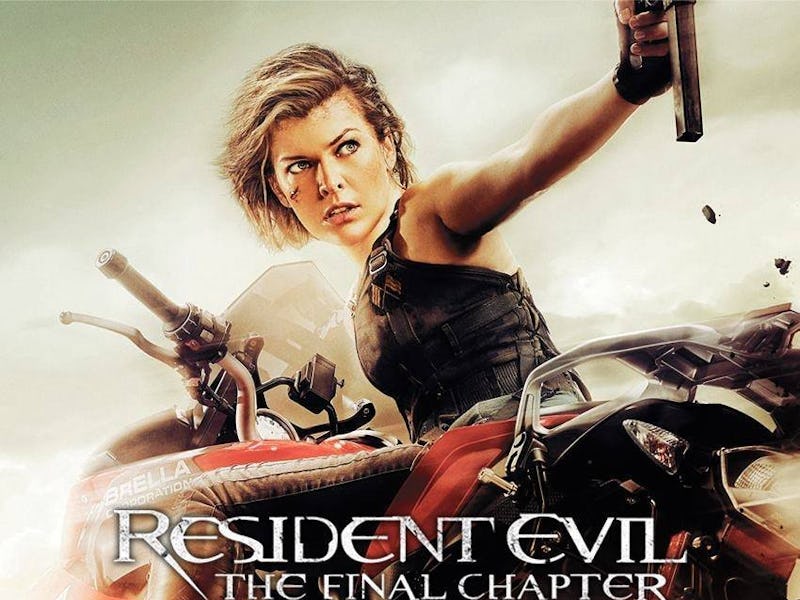Milla Jovovich Is Hollywood's Most Underrated Action Girl
As the'Resident Evil' series comes to a close, it's time to recognize Jovovich as the queen of action/sci-fi.

The Resident Evil series is the most lucrative horror movie franchise of all-time, and come Friday, it will finally finish its run with the release of its sixth and final chapter. The franchise, about the outbreak of a deadly zombie-creating virus, is perhaps the pièce de résistance of glorious B-movie excess and unique big-screen schlock. Throughout its nearly two-decade lifespan, the Resident Evil series has been lambasted by critics while being an unapologetically R-rated zombie action-adventure epic in a PG-13 franchise landscape. There are a lot of reasons it worked, but the success of the expansive video game adaptations can mostly be placed on the capable shoulders of the franchise’s solitary star: Milla Jovovich.
Born in the Ukraine, Jovovich emigrated to America from the U.S.S.R. when she was five years old, and she eventually became a model for photographer Richard Avedon before launching a film career. Early on, she had some notable small roles, the most memorable of which was as an off-kilter background character in Richard Linklater’s Dazed and Confused. It was as the lead in Luc Besson’s weirdo sci-fi tale The Fifth Element where she proved she could single-handedly carry a cinematic universe. Her magnetic presence as Leeloo, an orange-haired alien humanoid who helps Bruce Willis save the world, wound up outshining the hero’s tough-guy persona. Five years later, she signed up for the project that would cement her on-screen legacy.
Released in March 2002, Resident Evil cost just $35 million, but it was a pioneering, precedent-setting movie, putting zombies back in the spotlight. 28 Days Later wouldn’t rewrite the undead rules until it was released stateside in June 2003; the Dawn of the Dead remake only piggybacked on the trend, and Shaun of the Dead wouldn’t comedically subvert it until 2004. Yes, Resident Evil was an adaptation of a popular video game, but it was also a unique attempt to resuscitate the moribund horror sub-genre while also operating within a blockbuster cinematic universe — fronted by a female.
The plot was compact and simplistic in nature, reflecting the goal-based narrative of the video game source material. Jovovich’s amnesiac Alice wakes up in, and then has to escape from, a shady genetic research facility run by the equally shady Umbrella Corporation, while also trying to figure out why she was there in the first place. And she’s got to do all of that as she fends off hordes of hungry virus-infected mutants. Eventually, she emerges from her prison only to find out the zombie apocalypse happened beyond the facility walls, effectively expanding that universe out to invite the five films that would follow it.
Alice is obviously meant to fit into the “Final Girl” horror movie trope, but throughout the franchise she becomes more versatile and complicated. The 2004 sequel Apocalypse deals with the direct aftermath of the first film, while 2007’s small-scale Extinction sees her wandering the Mojave Desert for even more answers. Afterlife adds a Tokyo-tinged expansion of the story — seeing Alice cloned in the first 3D movie in the series — while Retribution refocuses the story and brings all her past demons back to haunt her. The Finale Chapter will put it to rest.
This kind of genre film usually replaces its lead actress with each sequel, yet Jovovich has been a constant force — she’s a female lead who is synonymous with a multi-year franchise about to cross $1 billion at the worldwide box office. Even the Kate Beckinsale-led Underworld movies aren’t that financially successful.
Jovovich was in her mid-20s when the franchise began, and she’s 41 now that The Final Chapter is about to hit theaters. You’d imagine any other franchise would’ve rebooted and recast the movies with an actress half her age by now. But Jovovich’s steadfast embrace of the genre and the complete ownership of the franchise has basically made her irreplaceable. Longevity in Hollywood films is a rare thing, and the stability here is aided by her marriage to writer/director Paul W.S. Anderson. Considering his own filmography at the helm of other films like Mortal Kombat and Alien vs. Predator, they’re like a pulp movie power couple.
Resident Evil was a female-driven franchise way before Star Wars decided to make Rey its new center. As this cinematic universe comes to a close, let’s hope Jovovich gets her just recognition for being such a pioneering cinematic badass.